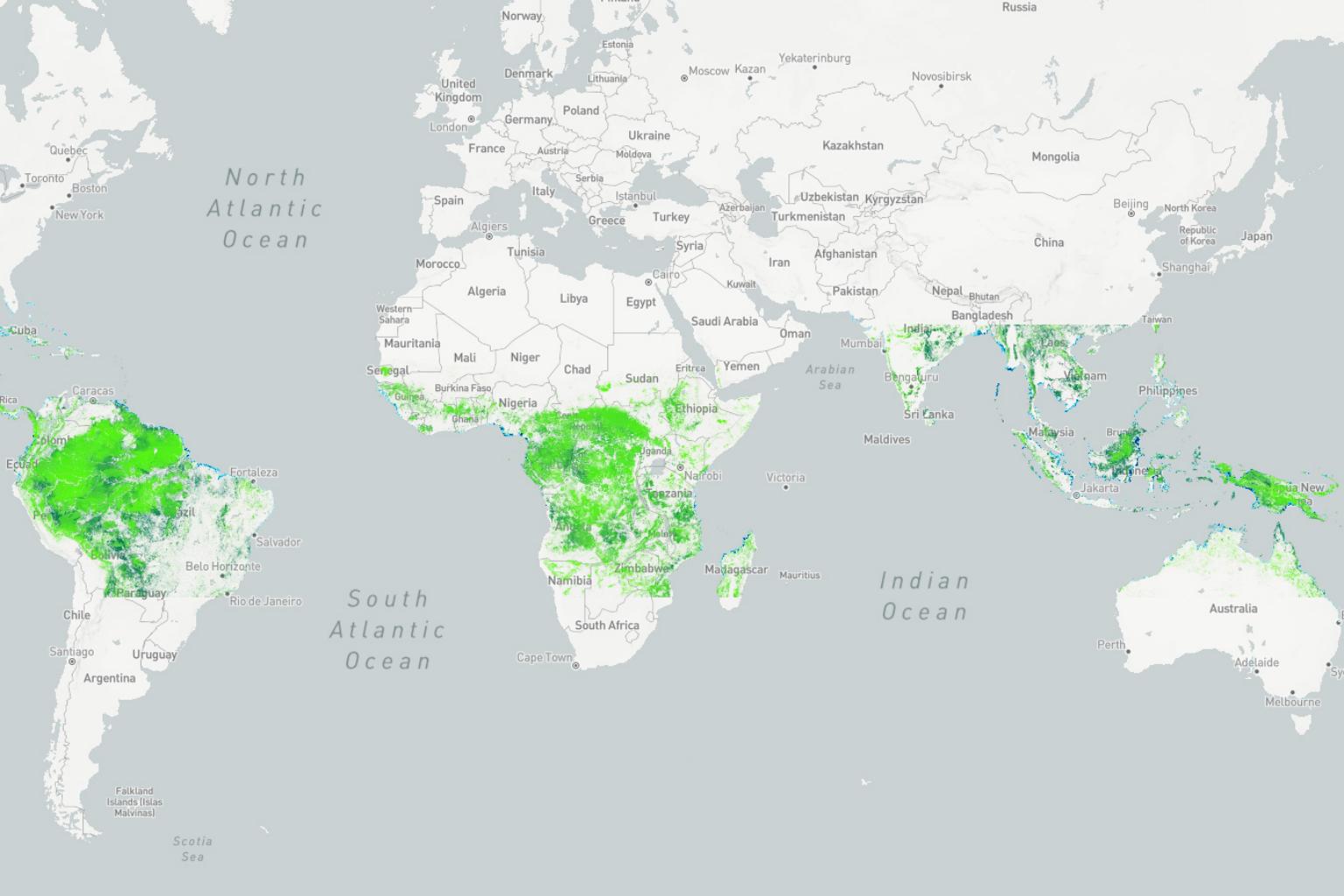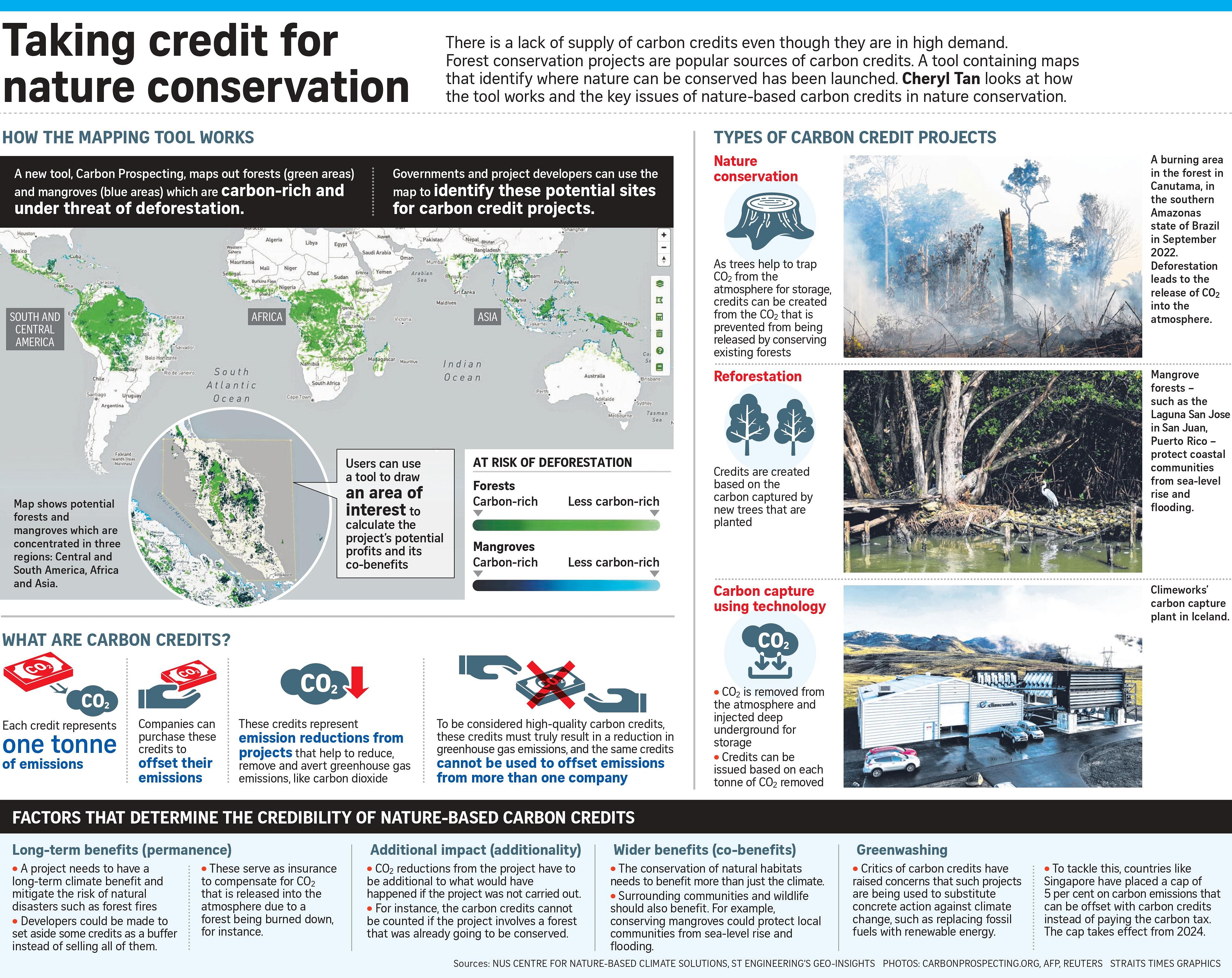New mapping tool helps to spot sources of high-quality, nature-based carbon credits
Sign up now: Get ST's newsletters delivered to your inbox

The platform, known as Carbon Prospecting, focuses on forests which are threatened by deforestation.
PHOTO: CARBON PROSPECTING
SINGAPORE - A new mapping tool to identify where natural ecosystems like tropical forests and mangroves can be conserved has been launched to identify potential sources of carbon credits.
Carbon credits refer to permits which companies or countries can buy from, say, a forest conservation project in Indonesia, to offset their greenhouse gas emissions. Each credit represents one tonne of emissions.
The platform, known as Carbon Prospecting, was launched by the National University of Singapore's (NUS) Centre for Nature-based Climate Solutions (CNCS) and ST Engineering's satellite data and geospatial analytics business, Geo-Insights.
Professor Koh Lian Pin, the director of NUS CNCS, said the platform focuses on forests which are threatened by deforestation and identifies areas which are carbon-rich to help policymakers and investors develop projects to tap a potential source of high-quality carbon credits.
As trees trap carbon dioxide from the atmosphere for storage, existing forests can be a source of carbon credits, which can be calculated by measuring the amount of CO2 that the trees have trapped.
The platform allows users to compare how much high-quality carbon credits can be generated from different parts of the world.
For example, it shows that Indonesia and Malaysia are among the best countries to avert carbon emissions by protecting their forests.
The platform also enables users to calculate the estimated yield of carbon credits and their financial return on investment, based on the conditions they seek, such as the duration of the project, costs of running the project, and their expected carbon price.
In addition, the platform quantifies the possible benefits of conserving tropical forests, such as their impact on biodiversity, clean water supply for those living around the area, and their food security.
Having such information on the co-benefits allows buyers to better assess the quality of the carbon credits, said Prof Koh.
"The demand for high-quality, nature-based carbon credits often outstrips supply. So such a platform can help developers to shorten the often complicated and costly process of identifying carbon project sites which would deliver the greatest benefits for the climate, biodiversity, and people living around the area," he added.
The platform was launched on Sept 22 at the World Economic Forum - Champions for Nature event in New York during Climate Week NYC 2022.
It is based on recently published peer-reviewed studies and ongoing research led by CNCS researchers, and will help to fill major research and development gaps that have hampered the implementation of nature-based climate solutions globally.
These gaps include uncertainties over the location of the most promising carbon stocks, how future carbon price hikes will enhance the economic prospects of nature protection, and where natural ecosystems are benefiting society the most, noted Prof Koh.

The NUS CNCS team will look for partners to develop more sophisticated versions of the current platform, said Prof Koh.
He envisions a global carbon intelligence platform that incorporates more layers of information - such as the importance of mangrove forests in providing coastal and flood protection - as well as the constraints and risks that nature-based projects may be facing, he added.
"For example, some parts of Indonesia experience higher risks of forest fires during certain times of the year. By presenting this information to potential investors and developers, they can better select the locations for their carbon projects," said Prof Koh.
Professor Stuart Pimm, the Doris Duke Professor of Conservation at Duke University, who was not involved in the study, said: "To protect biodiversity - and stop the deforestation that contributes to so much carbon emissions and global heating - we need to know where the forests and their carbon are. This vitally important tool provides that information."


